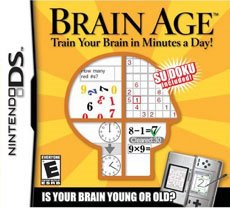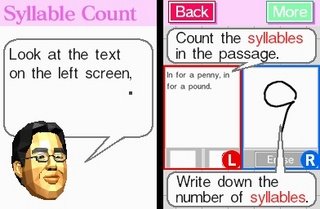My Brain Is 850-years old?!!! F@% you!!
 Remember those oh-so wonderful golden years of gaming during the mid-90's, when, the US Government wasted taxpayer money in an effort to sue the be-jesus out of Acclaim and Midway for the "evil" Mortal Kombat franchise? (Then again, when isn't Uncle Sam trying to sue the bejesus out of video game makers? Yesterday's "Mortal Kombat" and "Night Trap" is today's "Grand Theft Auto.") In an effort to battle critics who said that video games have no real intellectual value for children, some game publishers took it upon themselves to establish "edutainment" titles that would, in theory, serve as the perfect combination for growing children: video games, that were not only fun, but also educational at the same time! Nintendo was one of these publishers, creating such classics as "Mario Paint," and the absolutely memorable, "Mario is Missing." (Yup, it was memorable... for its absolute horridness... You can't hate on "Mario Paint", though...)
Remember those oh-so wonderful golden years of gaming during the mid-90's, when, the US Government wasted taxpayer money in an effort to sue the be-jesus out of Acclaim and Midway for the "evil" Mortal Kombat franchise? (Then again, when isn't Uncle Sam trying to sue the bejesus out of video game makers? Yesterday's "Mortal Kombat" and "Night Trap" is today's "Grand Theft Auto.") In an effort to battle critics who said that video games have no real intellectual value for children, some game publishers took it upon themselves to establish "edutainment" titles that would, in theory, serve as the perfect combination for growing children: video games, that were not only fun, but also educational at the same time! Nintendo was one of these publishers, creating such classics as "Mario Paint," and the absolutely memorable, "Mario is Missing." (Yup, it was memorable... for its absolute horridness... You can't hate on "Mario Paint", though...)Of course, hardly anyone bought these games, and within a couple of years, as the US Government began to ease off the gaming industry, these titles dropped of the face of the planet, and rightfully so, as the vast majority were just completely horrible and unimaginative. Some joked that these "games" were made horrible on purpose just to scare children off of video games forever.
Now, while edutainment titles have pretty much gone the way of the dinosaur, Nintendo's recently released DS title, "Brain Age: Train Your Brain Minutes A Day," on paper, could be mistaken for one of those old titles. I mean, what could possibly be fun about solving simple math problems as fast as you can, reading passages aloud, counting the number of syllables in a sentence, or drawing the continent of Africa from memory? Believe it or not, there's quite a lot of fun to be had in this tiny cart.

As one of the first titles Nintendo has released under its "Touch Generations" line of games, "Brain Age" is a title that aims to serve the needs of non-traditional gamers (read: everyone who isn't 14-21 years old, male, and likes to kill things) who enjoy games, but find that too many of them are simply too complicated to get into. The entire objective of the game is to improve your personal "Brain Age," an IQ-like measuring scale. According to the scale, the older your "Brain Age," the more "tired" (read: stupid) your brain is, with 20 being the youngest your brain can be, and 80 being the oldest. The game encourages you to play for a few minutes every day, religiously, in order to keep improving your Brain Age, and charts your progress over time. Skip a few days, and the game's built-in virtual doctor, Dr. Ryuta Kawashima, reprimands you slightly, but then encourages you to keep playing.
The game's brain exercises take full advantage of the DS' capabilities, such as the touchscreen and the built-in mic. Some of the exercises in the game include the aforementioned "Math x 20," where you have to solve as many simple math problems in 20 seconds using the touchscreen, and one where the game flashes the word of a particular color, and you have to say aloud what the color of the word is, not what the actual word says. For example, the game will flash the word, "Red," but you have to identify the word's actual color. The word "Red" could actually be yellow, so, you have to say aloud that the color is "yellow." Another game, "Time Lapse," measures your ability to tell time on a traditional clock, and asks you to identify how much time has passed between two different clocks, in as quick a time as possible. And it's even got Sudoku, that number-crunching puzzle game that has taken America by storm, built right into it, as well.

More likely than not, you'll probably feel absolutely retarded when you play the game for the first time, as you'll more than likely freeze up during your first encounter with "Math x 20." For the life of you, you just won't remember what the hell "9 x 7" is, and waste valuable seconds coming up with the answer. You'll be mad at yourself for stalling on a problem that any 2nd grader could do, and you'll find yourself playing the game every day just to make up for your first failure. And this is where the game really shines; it takes advantage of your own competitiveness and gets you to come back time and time again to keep improving your personal times.
The thing about the game, however, is that you can't sit down with it and play it for hours, as with traditional games. As the title says, you're only encouraged to play this game for a few minutes every day, as it will only record your times for the individual exercises and test your Brain Age once a day. In a way, you have to think of this game like a vitamin; you take it once a day to get your brain going, and then you move along to something else. The emphasis is to improve your brain over time. If you believe Nintendo's hype, the game is supposed to be beneficial to you in real life if you play it every day. In my personal experience with the game over two months, I actually did notice that my ability to figure out restaurant tips, for example, improved dramatically. So maybe there is some truth to the whole "Training" aspect of this title.
One thing that I've noticed about some of the recent DS titles is that while they're innovative and good, after awhile, they kind of lose their freshness and get old rather quickly. "Nintendogs," for example, was an incredibly innovative title that came out last year that took complete advantage of the DS' built-in hardware features, but did not deliver on the longevity aspect; I stopped playing the game after about 3 weeks and never bothered to pick it up since. "Brain Age," however, has actually maintained a spot in my DS over time, proving that at $20, this game is an incredible value, and doesn't require you to spend a whole lot of time with it. And, if for whatever reason, you can't play over an extended amount of time, you could always pick up the game, and pick up right where you left off. So, if you have a DS, and this sounds like your cup of tea, then go get it, or at least, demo it. Nintendo is offering free downloads of this game at participating Best Buys across the US, and if you're in New York City, you could stop by the Nintendo World store and pick up a free demo copy of the game as well. And if you don't have a DS, well, what are you waiting for?
PROS: Like a prostitute in Amsterdam, it's cheap, quick, and fun. Like many other games on the Nintendo DS, this game is unlike any other out there on the market today. The training exercises are varied and interesting enough to keep you coming back for more, and at times, the game might even just surprise you. The Sudoku portion of the game, which is separate from the rest of the Brain Age exercises, is a great alternative to using the traditional pen and paper method. The game's multiplayer mode is also fun as all hell.
CONS: At times, the game's voice recognition system behaves rather awkwardly. For example, when playing the color identification game, the voice recognition fails to pick up the word, "Blue." I've spent countless times shouting, "BLUEEE!!! BLUEEE!!! BlUE, bitch, BLUUEE!!!," and nothing. However, one day, I decided to try pronouncing the word in "Engrish," or English in a Japanese accent. Low and behold, the word, "Brew" worked better than "Blue," and I never had a problem after that. "Yerrow" worked, too, for those keeping score at home.
Wish List: Besides better voice recognition, it's hard to wish for more for a game like this besides the usual "more games" bit.